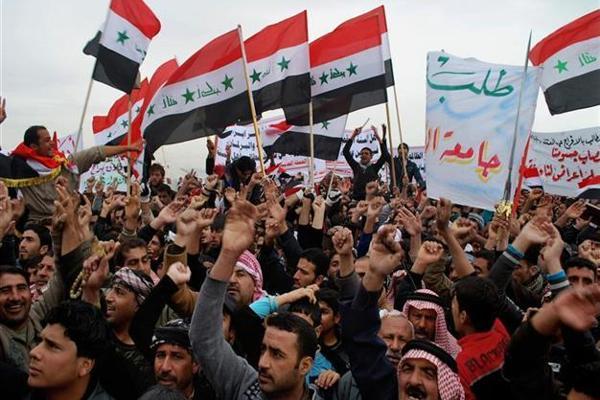Sunni, Kurdish boycott rocks Iraq Cabinet meet
BAGHDAD


Protesters chant pro-Iraqi Prime Minister Nouri al-Maliki slogans during a demonstration in Basra. The Sunni-backed Iraqiya bloc ministers stay away from the Cabinet meeting in support of the anti-Maliki protests. AP photo
Iraq became further divided between Sunnis and Shiites yesterday, as the Sunni Muslim and Kurdish ministers boycotted a Cabinet session to show support for protests against Shiite Prime Minister Nouri al-Maliki, while thousands of Shiites rallied in support of him.Thousands of protesters have demonstrated and blocked a key highway in Iraq’s Sunni provinces for more than two weeks in a direct challenge to al-Maliki, a leader many Sunnis feel has marginalized their community a year after the last U.S. troops pulled out. The boycott is the latest twist in a long-running standoff within Iraq’s unity government between al-Maliki and his critics, mainly Sunni Arabs, who accuse him of abusing counter-terror legislation to persecute the minority community.
The Sunni-backed Iraqiya party lawmakers said their ministers had stayed away from the Cabinet meeting yesterday in support of the protests sparked in late December when security forces arrested the bodyguards of Sunni Finance Minister Rafaie al-Esawi.
“They made a decision to boycott the session,” Iraqiya lawmaker Jaber al-Jaberi told Reuters. “They don’t see a response from the government to the demands of the protesters ... or to accepting power-sharing.”
Alaa Talabani, a Kurdish lawmaker, said party leaders had also asked Kurdish ministers to stay away. A senior government source at the meeting confirmed that Sunni and Kurdish ministers had missed the Council of Ministers session.
Violence and bombings are down sharply since the height of Iraq’s conflict, but the government, split among majority Shiites, minority Sunnis and ethnic Kurds, has been deadlocked over power-sharing since it was formed in December 2010.
Shiites hold counter-demos in southern Iraq
The ministers’ boycott came as thousands took to the streets in predominantly Shiite southern Iraq in a show of support for al-Maliki. Pro-government demonstrations were held in the port city of Basra, and the southern cities of Kut, Diwaniyah, Karbala and Samawa, dismissing calls for reform of anti-terror laws and condemning the alleged involvement of other Middle Eastern countries in the anti-government rallies.
The demonstrations ranged in numbers from several hundred people in Kut to thousands in Basra. Demonstrators carried photographs of relatives they said were killed in militant attacks, as well as Iraqi flags and banners painted with slogans including, “With our blood and souls, we will protect Iraq,” and “No, No to Sectarianism; Yes, Yes to National Unity.”
Some placards backed al-Maliki, while others asked, “Is it just to release those responsible for killing?” a reference to calls in anti-government protests for the release of prisoners allegedly being wrongfully held. Anti-government rallies continued yesterday in Anbar, as well as in several cities in Salaheddin province, north of Baghdad.
Although the demonstrations in southern Iraq have been predominantly Shiite and the protests in northern and western Iraq mostly Sunni, powerful Shiite cleric Moqtada al-Sadr has publicly backed the anti-government rallies.
Compiled from AFP and Reuters stories by the Daily News staff.
